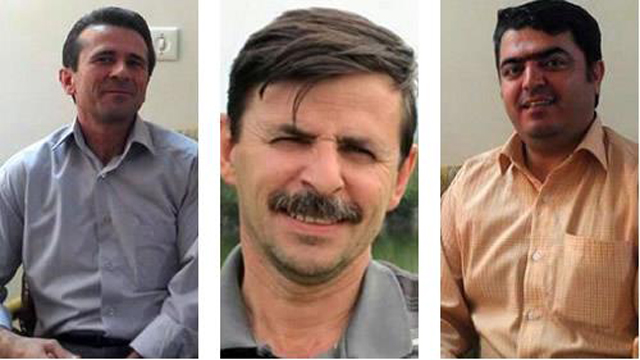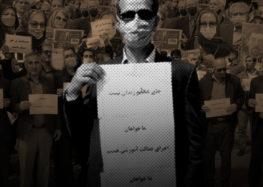Briefly Freed After Long Hunger Strikes, Three Teachers’ Rights Leaders Ordered Back to Prison

Prominent teachers’ rights leaders Jafar Azimzadeh, Esmail Abdi, and Mahmoud Beheshti-Langroudi—who had all been previously imprisoned for their peaceful activism and released in 2016 on bail after going on long hunger strikes—were summoned back to prison in October 2016.
Abdi, secretary general of the Iranian Teachers’ Trade Association, confirmed to the International Campaign for Human Rights in Iran that Branch 36 of the Tehran Appeals Court had upheld his six-year prison sentence on October 7, 2016 and ordered him back to prison.
“Only two days later, on October 9, I was contacted by Evin Prison officials three times and told to report back to prison. But I told them that verbal summons don’t count and they should summon me in writing,” said Abdi.
Beheshti-Langroudi and Azimzadeh were also summoned by phone on October 23 and 24 respectively and ordered back to Evin Prison.
“On one hand, by accusing activist teachers of national security crimes and jailing them, the Islamic Republic wants to warn the new leadership of the Teachers’ Trade Association that they would have the same fate if they start defending teachers’ demands,” a member of the Trade Association, who asked to remain anonymous, told the Campaign. “On the other hand, it will discourage teachers from seeking their rightful demands during the presidential election (in May 2017).”
“Esmail Abdi and Mahmoud Beheshti were not engaged in any kind of political activity. They were not fighting for power or a ministerial position. They are completely innocent,” said the source. “They were elected by their colleagues to seek nothing more than their rights stated in the Constitution, things like insurance and housing for teachers. They are being unlawfully incarcerated even though all they did was peacefully seek their rights [stipulated] in the Constitution.”
Azimzadeh, chairman of the Free Workers Union of Iran, was released on furlough (temporary leave) on June 30, 2016 after going on a hunger strike that lasted nearly two months. He was sentenced to six years in prison in 2015 for “assembly and collusion against national security” and “propaganda against the state.”
Beheshti-Langroudi, a senior board member of the Iranian Teachers’ Trade Association, was granted conditional release on May 11, 2016 after a 22-day hunger strike. He has been sentenced to a total of 14 years in prison in three separate cases for his peaceful union activities.
Independent unions are not allowed to function in Iran, workers are routinely fired and risk arrest for striking, and labor leaders are prosecuted under national security charges and sentenced to long prison terms.
Since its establishment in 1998, dozens of members of the Iranian’ Teachers’ Trade Association, and independent teachers’ rights activists, have been arrested and imprisoned for terms ranging from four to 15 years for their peaceful activism.
In an interview with the Campaign in September 2016, Abdi said that in accordance with Article 10 of the Parties and Associations Law, the Interior Ministry under President Hassan Rouhani had issued permits for more than a dozen professional teachers’ rights groups, but had also demanded that their operations be limited to local provincial branches rather than to those of national entities.
“Ostensibly, they want professional organizations to expand and be active in every province. But … what they are really trying to do is to prevent us from having a national organization… I think this plan has been injected into the Interior Ministry by the security forces so that we would not be effective in all cities near and far,” he said.






